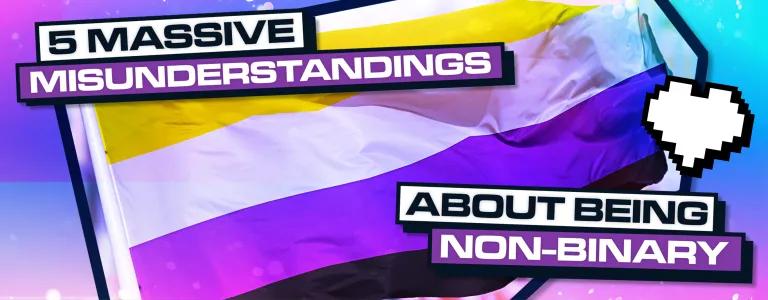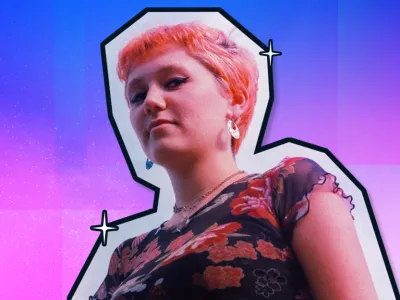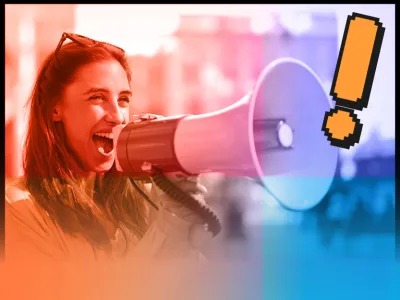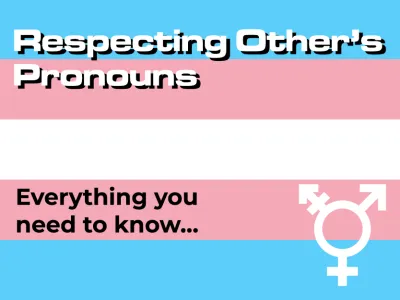
5 Massive Misunderstandings About Being Non-Binary
By: Zoë (they/she) who loves whippets, singing, watching Wimbledon, and who also happens to be non-binary.
So, what does it mean to be non-binary? If you search online, you might get an answer along the lines of ‘a non-binary person is someone who doesn’t identify as a man or a woman, or solely as one of those two genders.’ But there’s a bit more to it than that, and there’s a lot of misconceptions and misunderstandings too. So let’s clear a few of those up…
1. Being non-binary means different things to different people.
So yes, some people might identify as non-binary because the label of ‘woman’ or ‘man’ just doesn’t feel ‘right’ for them. Other people might feel like they’re both ‘woman’ and ‘man’, and so the term non-binary encompasses both those parts of them. And other people might reject the entire construct of gender.
Let’s be clear, the words ‘woman’ and ‘man’ aren’t simply letters on a page. They come with certain connotations, images, meanings, and expectations — and when all of that doesn’t sit well with someone, or they don’t relate to them, then ‘non-binary’ might feel a lot more comfortable, and a lot more freeing.
Free to be themselves.
Free to see themselves and others simply as humans, as equals.
Non-binary may still be a label, but it can often feel much more expansive than ‘man’ or ‘woman’.
2. Being non-binary has nothing to do with your sexuality.
You can be straight and non-binary. Gay and non-binary. Asexual and non-binary. You get the picture — being non-binary is about you and your gender, and not who you feel sexually or romantically attracted to.
Mae Martin, the stand-up comedian, actor and scriptwriter, drilled this point home when they shared on their Insta back in 2021 that, “The way I feel about my gender identity is ongoing and evolving, and it’s personal, but I thought it might be good to say for clarity and in case anyone finds it helpful - I’m non-binary, my pronouns are they/them. I’m very bisexual and attracted to people of all genders.”
3. Not all non-binary people use they/them pronouns
You can be non-binary and use she/her or he/him pronouns. Or you might prefer to use they/them, mix it up with they/he or they/she, or have no pronouns at all. It’s all about doing you, and deciding what feels right for you.
4. Being non-binary is nothing new.
We do live in a binary system. (Binary means ‘relating to, or involving two things’). As soon as we’re born, we’re classified into one of two options: girl or boy. And throughout our lives, we’re asked to clarify our gender identity over and over again. Job applications. Passports. Choosing which bathroom to use. Even doing sports. And more and more people are now outside of the binary, including actor Bella Ramsey — who shared earlier this year that they tick the ‘non-binary’ option on forms as they identify as non-binary and gender-fluid. That might feel new to some people. But other cultures have long acknowledged that people exist outside of the gender binary.
The Native American Navajo tribes recognize five genders, and some indigenous cultures recognise more than that. So having a gender identity outside of the man/woman binary is nothing new. It’s not a phase. It’s not radical. It simply allows people to be true to themselves.
5. There’s no such thing as ‘looking non-binary’ or having a ‘non-binary name’.
We need to squash the misconception that all non-binary people look androgynous. Some might, and that’s totally cool. But the truth is, there’s no way to tell someone’s gender identity from what they’re wearing — that’s why it’s best to ask, rather than assume.
Equally, if you’re non-binary then your name could be Katie, Maya, Thomas, River, Joaquin… there’s no such thing as a ‘non-binary name’.
A final point (call it a bonus number 6 if you will!)
Someone’s gender identity may or may not be a big deal to them. Some people might have gone through a long personal journey before identifying as non-binary. It could feel very important to them, and they may want to talk about it in detail. But for other people, their gender identity might not feel like a big deal, and their love of DnD or basketball might feel far more important when it comes to what they see as ‘their identity’.
So… don’t make assumptions, treat people with love, be a good ally (you can find more about how to do that here), and above all: be true to who you are!
Want to grow your confidence and boost your independence? Check out these NCS experiences.




